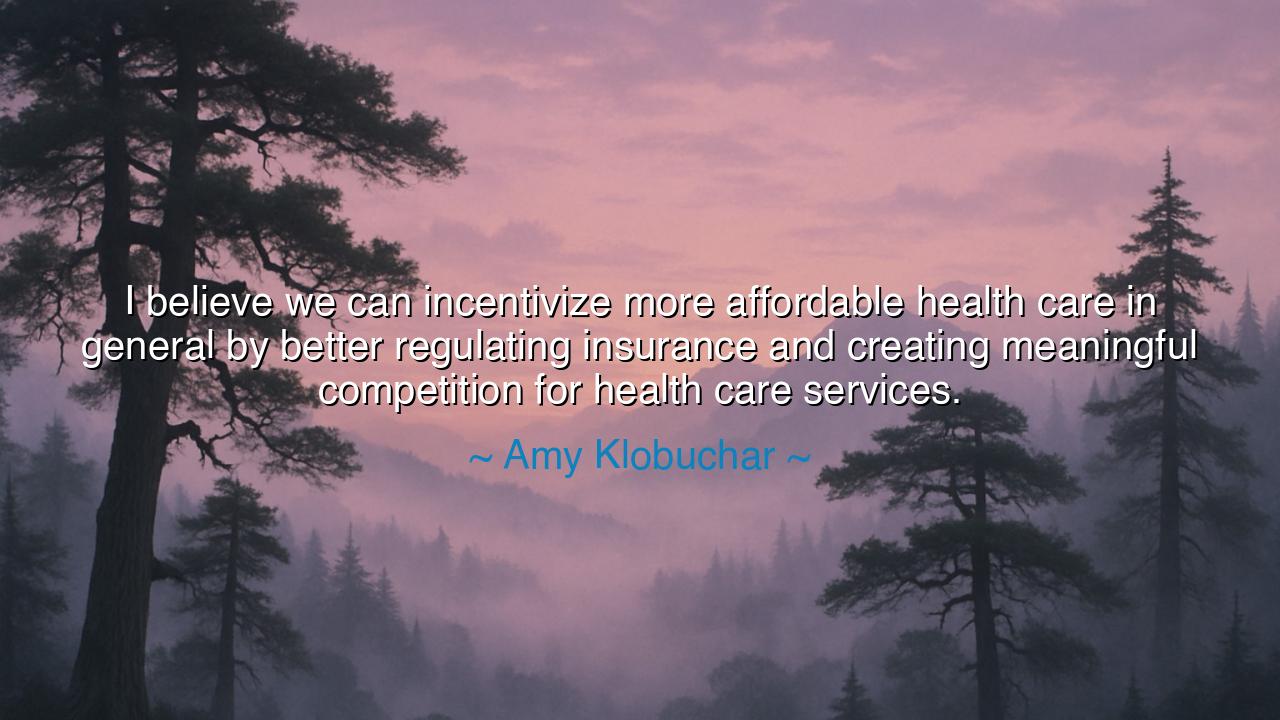
I believe we can incentivize more affordable health care in
I believe we can incentivize more affordable health care in general by better regulating insurance and creating meaningful competition for health care services.






The words of Amy Klobuchar — “I believe we can incentivize more affordable health care in general by better regulating insurance and creating meaningful competition for health care services” — arise not merely from political thought, but from a deeper yearning for fairness and balance in the structure of human society. Beneath her pragmatic tone lies a truth that has echoed through the ages: that prosperity without justice breeds suffering, and that systems left unchecked by conscience will always tilt toward greed. Klobuchar speaks as one who sees the suffering of ordinary people — men and women caught between illness and expense — and calls for reform rooted not in power, but in principle.
In the world of the ancients, the wise understood that harmony in a nation was like harmony in the body. The body politic, they said, must be nourished by fairness as the body is nourished by air and food. When one organ — the powerful or the wealthy — grows swollen while the rest starves, sickness follows. So it is with modern health care: when insurance and medicine become tools of profit rather than instruments of compassion, the spirit of healing is lost. Klobuchar’s call to better regulate insurance is thus an ancient act of rebalancing — the reassertion of justice over chaos, and of service over self-interest.
The origin of her words lies in the reality of a system that too often burdens the sick rather than relieves them. In America’s vast network of hospitals and insurers, competition has withered into monopoly, and choice — the lifeblood of fairness — has grown scarce. Where once the market promised innovation and access, it now too often delivers confusion and debt. Klobuchar’s vision is not the destruction of enterprise, but its purification: to restore competition that serves the public good, not the private few. For just as fire must be contained by hearth and law must be tempered by mercy, so too must commerce be guided by conscience.
History, too, bears witness to the wisdom of her words. When Theodore Roosevelt faced the monopolies of his time — great railroads and oil empires that crushed the common man — he did not destroy industry, but disciplined it. Through regulation and fair competition, he brought prosperity to the many without strangling the ambition of the few. So it must be with health care. Klobuchar’s belief follows the same moral current: that freedom and fairness can coexist only when power is bound by accountability, and when the rules serve the people, not the privileged.
Her idea of meaningful competition is not a contest of greed, but of virtue — where providers strive to heal more efficiently, to serve more humanely, to innovate without exploitation. It recalls the spirit of ancient healers who competed not for wealth, but for wisdom — who measured their success not in coin, but in lives restored. Such competition strengthens civilization; it turns rivalry into progress, and ambition into benefit. But without regulation, competition decays into corruption, and the healer becomes a merchant of suffering.
At its heart, Klobuchar’s quote carries a moral lesson deeper than policy. It reminds us that a nation’s true wealth lies in the health of its people, not in the profits of its corporations. To make health care affordable is not an act of charity, but of justice — for life and health are not luxuries, but the foundation of all human endeavor. When a society protects its weakest, it strengthens its soul. When it values profit over people, it invites decay.
So, my children of this modern age, learn this enduring truth: systems must serve humanity, not enslave it. Demand leaders who seek balance, not favor. Support those who regulate with wisdom and create with compassion. Do not scorn reform, for reform is the breath of life in any civilization — the pruning that allows the tree to bear fruit anew.
Let Klobuchar’s words be a torch for our time: that through fair regulation, moral competition, and the courage to challenge excess, we may build a system worthy of the name “health care” — one that heals both body and nation, restoring the sacred covenant between governance, goodness, and the people they were born to serve.






AAdministratorAdministrator
Welcome, honored guests. Please leave a comment, we will respond soon